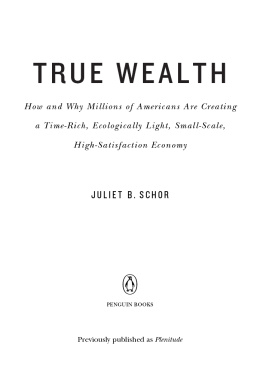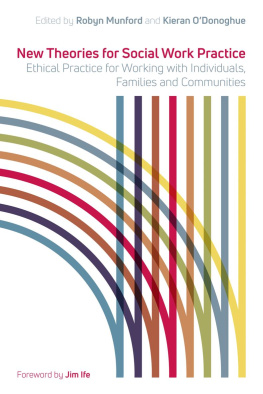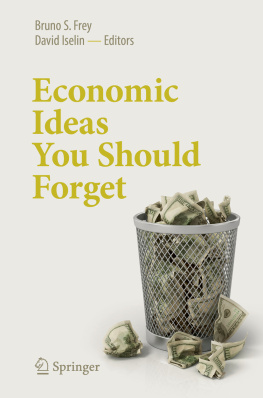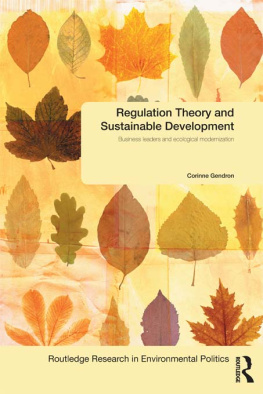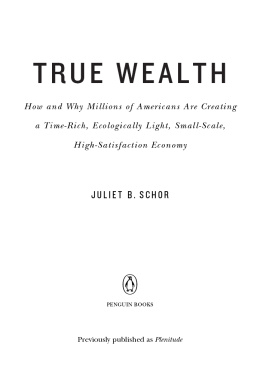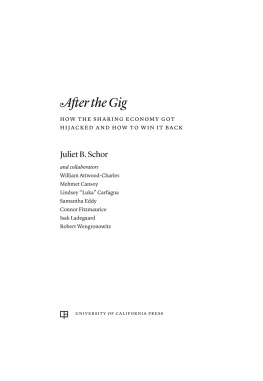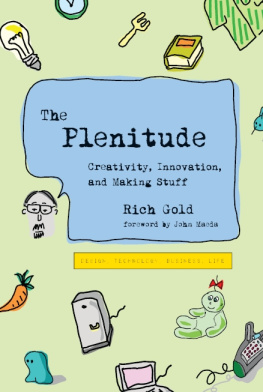PENGUIN BOOKS
TRUE WEALTH
Juliet B. Schors research has focused on the economics of work, spending, environment, and the consumer culture. She is the author of Born to Buy, The Overworked American, and The Overspent American. Schor is a professor of sociology at Boston College, a former member of the Harvard economics department, and a Guggenheim Fellowship recipient. She is also a cofounder of the Center for a New American Dream, an organization devoted to ecologically and socially sustainable lifestyles.
TRUE WEALTH
How and Why Millions of Americans Are Creating
a Time-Rich, Ecologically Light, Small-Scale,
High-Satisfaction Economy
JULIET B. SCHOR

PENGUIN BOOKS
Previously published as Plenitude
PENGUIN BOOKS
Published by the Penguin Group
Penguin Group (USA) Inc., 375 Hudson Street, New York, New York 10014, U.S.A. Penguin Group (Canada), 90 Eglinton Avenue East, Suite 700, Toronto, Ontario, Canada M4P 2Y3 (a division of Pearson Penguin Canada Inc.) Penguin Books Ltd, 80 Strand, London WC2R 0RL, England Penguin Ireland, 25 St. Stephens Green, Dublin 2, Ireland (a division of Penguin Books Ltd) Penguin Books Australia Ltd, 250 Camberwell Road, Camberwell, Victoria 3124, Australia (a division of Pearson Australia Group Pty Ltd) Penguin Books India Pvt Ltd, 11 Community Centre, Panchsheel Park, New Delhi - 110 017, India Penguin Group (NZ), 67 Apollo Drive, Rosedale, Auckland 0632, New Zealand (a division of Pearson New Zealand Ltd) Penguin Books (South Africa) (Pty) Ltd, 24 Sturdee Avenue, Rosebank, Johannesburg 2196, South Africa
Penguin Books Ltd, Registered Offices: 80 Strand, London WC2R 0RL, England
First published in the United States of America as Plenitude by The Penguin Press, a member of Penguin Group (USA) Inc. 2010 Published with a new preface in Penguin Books 2011
Copyright Juliet B. Schor, 2010, 2011
All rights reserved
Charts and graphs by the author
THE LIBRARY OF CONGRESS HAS CATALOGED THE HARDCOVER EDITION AS FOLLOWS:
Schor, Juliet.
Plenitude : the new economics of true wealth / Juliet B. Schor.
p. cm.
Includes bibliographical references and index.
ISBN: 978-1-101-54356-6
1. Wealth. 2. Sustainable development. I. Title.
HC79.W4S35 2010
338.927dc22 2009046474
DESIGNED BY AMANDA DEWEY
Except in the United States of America, this book is sold subject to the condition that it shall not, by way of trade or otherwise, be lent, resold, hired out, or otherwise circulated without the publishers prior consent in any form of binding or cover other than that in which it is published and without a similar condition including this condition being imposed on the subsequent purchaser.
The scanning, uploading, and distribution of this book via the Internet or via any other means without the permission of the publisher is illegal and punishable by law. Please purchase only authorized electronic editions and do not participate in or encourage electronic piracy of copyrightable materials. Your support of the authors rights is appreciated.
To Prasannan
Preface
In the year and a half since I completed the final revisions for the hardcover version of True Wealth, a great deal has happened. 2010 has officially been recorded as one of the two hottest years on record. The once-in-a-hundred-year drought the Brazilian Amazon experienced in 2005 was repeated just five years later. There has been a Russian heat wave, severe flooding in Australia and Pakistan, and, in early 2011, news that Chinas major wheat-producing area is facing its worst drought in sixty years. Agricultural yields for corn and wheat are in jeopardy, and food prices are again rising sharply, leading to hunger and political unrest. Energy prices are also rising, as evidence mounts that we are reaching a peak in oil production. A growing body of research suggests that the massive BP oil spill created far more destruction to ocean ecosystems than the official story allows. All around the world, there are signs of accelerated climate disruption and ecological distress.
And yet I feel hopeful. The grassroots movement I described in the book is thriving. The push for urban food production has been particularly successful and is moving beyond farmers markets and gardening to the building of sizable enterprises. These include Will Allens Growing Power in Milwaukee and the remarkable transformation of Detroit, where participants report they are turning Motown into Growtown. A large-scale effort is well under way in Cleveland, where the Evergreen Cooperatives launched four sustainable businessesa laundry, a newspaper, a solar power producer, and an organic farmall of which are owned by low-income workers from the community. There has been tremendous interest from around the country in replicating the Cleveland model as urban locales, facing high unemployment, declining investment dollars, and ambitious targets for carbon reduction, look for new ways to move forward. One of the most exciting aspects of these initiatives is that they are laying the groundwork for moving to an economy that is made up of many types of companies with varied ownership structures, motives for action, and ways of operating in the world. Were leaving behind the twentieth-century idea that theres one best model. That means transcending the domination of corporate megaliths to a much more pluralistic, hybridized collection of smaller, varied enterprises.
On the consumption side, the new consumer practices I identified in the book appear to be expanding rapidly, although there are not yet hard numbers to quantify participants or practices. But car sharing, couch-surfing, sharing of unused residential space (Airbnb), freecycling, tool libraries, and the like are proliferating. There are more and more swapping groups and organizations that allow people to exchange used toys, clothing, books, and household items. There are sites to help people share work space, land for gardening, or storage space. Local collectives are sharing cooking, from just soup to whole meals. There has been a growth of groups that share timethat is, trade services among each other (Ill give you a ride if you watch my child.) People are saving money, lightening their eco-footprint, and building community as they engage in this new world of shared, or connected consumption.
On the economic policy front, however, there is less to be upbeat about. My book situated our environmental challenges within the collapse of the global economy in 2008. The central argument was that our economic system is broken, that standard solutions wouldnt be sufficientespecially to solve the unemployment crisisand that we needed to move forward with deep transformations that address our ecological footprint and unemployment simultaneously. Developments over the last year and a half support that point of view. I argued that the downturn was far more severe than many economists allowed, that recovery would fail to produce jobs at anything like the rate needed to put people back to work, and that for most Americans, the future held more economic uncertainty and lower real returns for their labor and skills. So far, those predictions are being borne out.
Through nearly two years of recovery, job growth has been minimal. More than 25 million Americans remain either fully unemployed, underemployed, or have been discouraged from seeking work. Economic Policy Institute economist Robert Scott estimates that in 2010, U.S. corporations created more jobs abroad than domestically (1.4 million versus 1 million). Substantial productivity growth of 3.5 percent in 2009 and 2010 further reduced demand for labor. Strong outsourcing and productivity growth are two reasons why the standard trickle-down approach to job creationtry and rev up the economy as much as possiblewill fail.

